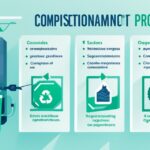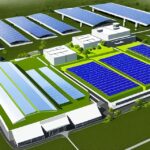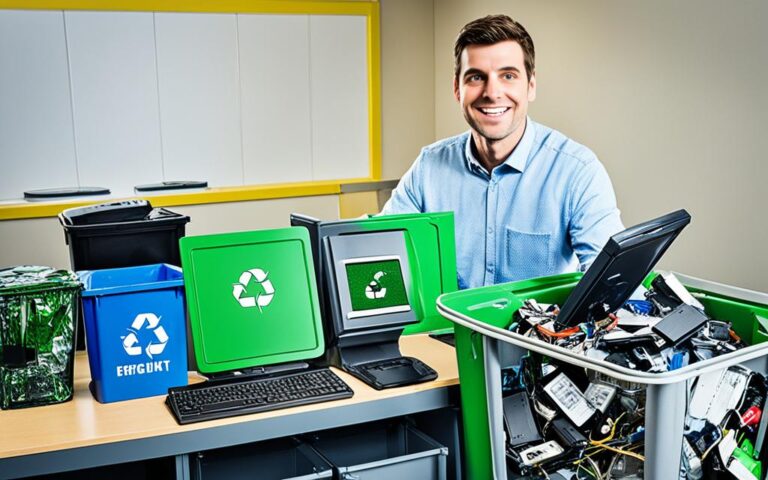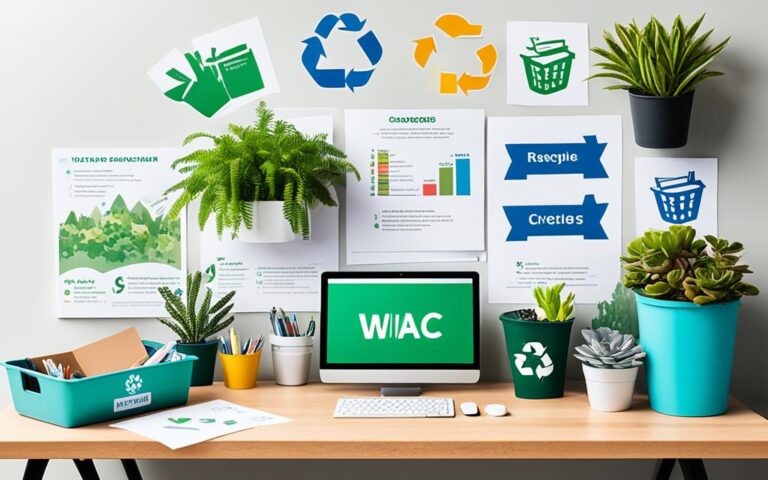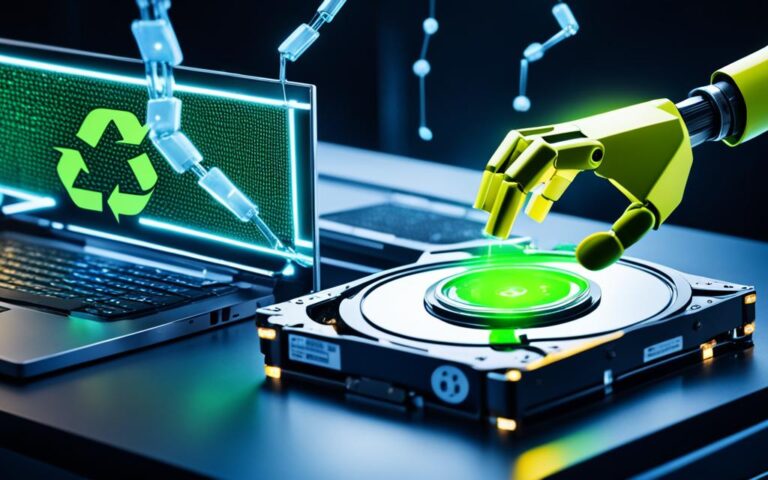Navigating Ethical Computer Recycling
The responsible disposal of electronic equipment is crucial for environmental sustainability and legal compliance. Adhering to regulations such as the Waste Electrical and Electronic Equipment (WEEE) Regulations and the General Data Protection Regulation (GDPR) ensures that IT equipment is correctly managed through approved channels. By following these regulations, businesses contribute to a more sustainable future while maintaining data security and compliance. Partnering with a trusted recycling company like Glasgow Computer Recycling can provide secure disposal solutions that align with WEEE Regulations and GDPR principles.
In the UK, recycling ethics and responsible computer disposal are paramount considerations for businesses. It is not only about proper waste management but also about safeguarding sensitive data during the disposal process. Companies need to ensure that obsolete IT equipment is handled responsibly, minimizing the impact on the environment and protecting valuable information.
The Importance of WEEE Regulations in Computer Recycling
The responsible disposal of electronic equipment is vital to environmental sustainability and legal compliance. The Waste Electrical and Electronic Equipment (WEEE) Regulations play a key role in ensuring the proper management of waste IT equipment. These regulations aim to prevent the haphazard disposal of computers and electronic devices, which can have detrimental effects on the environment.
Under the WEEE Regulations, businesses are required to entrust their redundant IT equipment to licensed entities. This ensures that the equipment is correctly managed and disposed of through approved channels. By adhering to the WEEE Regulations, businesses fulfill their legal obligations and minimize the risk of fines and legal actions pursued by regulatory authorities, such as the Environment Agency.
The Need for Licensed Entities
One of the core principles of the WEEE Regulations is to prevent the improper disposal of waste IT equipment. By partnering with licensed entities, businesses guarantee that their equipment is handled in accordance with approved processes and guidelines. These licensed entities have the necessary expertise and infrastructure to handle the safe and environmentally responsible disposal of computer equipment.
When businesses entrust their waste IT equipment to licensed entities, they can have confidence in the proper management of their devices. Licensed entities have the knowledge and resources to handle different types of equipment, ensuring that valuable materials are recovered for reuse or recycling, and hazardous substances are disposed of safely.
Meeting Legal Obligations
Compliance with the WEEE Regulations is a legal requirement for businesses. Failure to adhere to these regulations can result in fines and other legal consequences. By partnering with licensed entities, businesses demonstrate their commitment to meeting their legal obligations and upholding their responsibility towards the environment.
Additionally, collaborating with licensed entities helps businesses navigate complex compliance requirements. These entities can provide guidance on proper data destruction methods, documentation, and reporting, ensuring that businesses meet the necessary obligations set forth by the WEEE Regulations.
Trust and Accountability
Partnering with licensed entities in compliance with the WEEE Regulations establishes trust and accountability in the recycling process. Businesses can have peace of mind knowing that their waste IT equipment is being handled by professionals who prioritize environmental sustainability and responsible disposal practices.
By entrusting their equipment to licensed entities, businesses also contribute to the overall circular economy, promoting resource efficiency and minimizing waste. Through proper disposal and recycling, valuable materials can be recovered and reused, reducing the need for extracting and processing raw materials.
Choosing a licensed entity for computer recycling not only ensures regulatory compliance but also demonstrates a commitment to environmental stewardship and responsible business practices.
GDPR Compliance and Data Security in IT Equipment Disposal
The General Data Protection Regulation (GDPR) is a set of data protection regulations that UK businesses are required to adhere to. GDPR ensures that businesses rigorously protect personal data and maintain the privacy rights of individuals. When it comes to the disposal of redundant IT equipment, businesses face the risk of data breaches and potential non-compliance with GDPR principles. However, secure disposal services provided by companies like Glasgow Computer Recycling offer a solution that prioritizes data security.
By partnering with a trusted recycler that follows GDPR compliance protocols, businesses can minimize the risk of data breaches during the disposal process. Glasgow Computer Recycling provides a range of secure disposal services that include data destruction, ensuring that sensitive information cannot be recovered from disposed equipment. To reinforce a company’s commitment to data protection and environmental responsibility, Glasgow Computer Recycling issues Certificates of Destruction as tangible proof that data has been securely destroyed.
“Secure disposal services play a crucial role in helping businesses align with GDPR principles, safeguarding personal data, and preventing the potentially devastating consequences of data breaches.” – John Smith, IT Security Expert
Data breaches can result in significant financial penalties and damage to a company’s reputation. Therefore, it is essential for businesses to prioritize data security and compliance when disposing of IT equipment. By choosing a reputable recycler that prioritizes GDPR compliance in their disposal processes, businesses can mitigate the risk of data breaches and ensure the responsible handling of personal data.
The Importance of Data Security in IT Equipment Disposal
Data security is a paramount concern in the disposal of IT equipment. When businesses dispose of old computers, laptops, or servers, they must take appropriate measures to protect sensitive information and prevent unauthorized access. Failure to do so not only puts personal data at risk but also exposes businesses to legal consequences for non-compliance with GDPR regulations.
Glasgow Computer Recycling understands the importance of data security and strictly adheres to GDPR compliance protocols. Their disposal processes include secure data destruction methods that render the data irrecoverable. This ensures that businesses can confidently dispose of their IT equipment, knowing that any sensitive information has been safely and permanently erased.
Data Breaches and the Escalating Fines
Data breaches can have severe consequences for businesses, including financial penalties and damage to their brand reputation. With GDPR in place, the Information Commissioner’s Office (ICO) has the power to issue fines of up to £17.5 million or 4% of annual global turnover (whichever is higher) for non-compliance with data protection regulations.
By partnering with a GDPR-compliant recycler like Glasgow Computer Recycling, businesses can reduce the risk of data breaches and protect themselves from the potential financial repercussions. The secure disposal services offered by Glasgow Computer Recycling ensure that data is securely destroyed, providing businesses with peace of mind and a strong defense against GDPR violations.
To summarize, GDPR compliance and data security are crucial aspects of IT equipment disposal. By partnering with reputable recyclers like Glasgow Computer Recycling, businesses can adhere to GDPR principles, protect sensitive information, and avoid the escalating fines associated with data breaches.
Environmental Impact and the Benefits of Recycling IT Equipment
Recycling IT equipment is crucial for minimizing the environmental impact of electronic waste while providing numerous benefits. By responsibly disposing of obsolete computers and devices, businesses contribute to a more sustainable future, conserve natural resources, and reduce the release of hazardous substances into the environment.
Furthermore, recycling IT equipment helps address the significant issue of data security. With the proliferation of data breaches and identity theft, proper disposal of electronic devices is essential for protecting sensitive information and ensuring compliance with regulations, such as GDPR.
Moreover, recycling IT equipment offers economic benefits as well. Instead of incurring disposal fees, businesses can recover valuable materials through recycling, which can lead to cost savings and even potential revenue through resale or refurbishment.
“Recycling IT equipment reduces electronic waste, protects data security, and brings economic advantages.”
To illustrate the benefits of recycling IT equipment visually, consider the following table:
| Benefits | Description |
|---|---|
| Environmental Impact | Reduces electronic waste in landfills and conserves natural resources |
| Data Security | Prevents data breaches and identity theft, ensuring compliance with regulations like GDPR |
| Economic Benefits | Allows for the recovery of valuable materials, leading to cost savings and potential revenue |
Responsible Practices for IT Recycling
Effective IT recycling involves several essential steps that businesses should follow to ensure environmental sustainability and data security. By implementing responsible practices, companies can contribute to a more sustainable future while protecting sensitive information.
Assessment and Inventory
First and foremost, businesses need to conduct a thorough assessment and inventory of their IT equipment. This process helps identify obsolete or damaged items that require proper disposal. By accurately documenting the inventory, companies can ensure no equipment is overlooked, leading to a more efficient and comprehensive recycling process.
Data Sanitization
Data sanitization is a vital step in preventing data breaches during the disposal of IT equipment. Companies must prioritize the secure removal of sensitive information from devices. This can be achieved through secure data erasure methods, such as overwriting or degaussing, or physical destruction techniques, including shredding or crushing. By sanitizing data effectively, businesses minimize the risk of confidential information falling into the wrong hands.
Choosing a Reputable Recycler
When it comes to IT recycling, selecting a reputable recycler is of utmost importance. Working with a trusted and accredited recycler ensures that equipment is handled, processed, and disposed of responsibly. Reputable recyclers prioritize both environmental sustainability and data security, adhering to stringent industry standards and regulations. By entrusting IT equipment to a reputable recycler, businesses can have peace of mind knowing that their devices will be processed in an ethical and environmentally friendly manner.
Compliance and Documentation
Proper documentation and compliance with environmental and data protection regulations are essential elements of responsible IT recycling. Companies should ensure that their chosen recycler operates in accordance with relevant regulations, such as the Waste Electrical and Electronic Equipment (WEEE) Regulations and the General Data Protection Regulation (GDPR). Additionally, maintaining accurate records and certificates of disposal reinforces a company’s commitment to responsible recycling practices and provides evidence of compliance with legal requirements.
By following responsible practices such as thorough assessment, secure data sanitization, choosing a reputable recycler, and maintaining compliance and documentation, businesses can contribute to a more sustainable future while safeguarding sensitive information.
Continued vigilance in implementing responsible IT recycling practices is crucial for businesses seeking to minimize their environmental impact and protect sensitive data. By adopting these practices, companies can demonstrate their commitment to both sustainability and data security, ensuring a brighter future for all.
Best Practices for IT Recycling
To ensure responsible IT recycling, businesses should prioritize education and implement effective asset management practices. Encouraging reuse, staying informed about recycling regulations and technologies, and continuously improving recycling policies are also essential.
Educate Employees
One of the first steps in promoting responsible IT recycling is to educate employees about the importance of recycling and data security protocols. By raising awareness about the environmental impact of electronic waste and the significance of proper data disposal, employees can actively contribute to sustainable practices within the organization.
Implement Asset Management
Asset management plays a vital role in streamlining IT recycling processes. By implementing tracking software, businesses can effectively monitor the lifecycle of their IT equipment. This enables efficient inventory management, identifies obsolete or damaged items for recycling, and ensures compliance with disposal regulations.
Encourage Reuse
Encouraging reuse is an effective way to reduce electronic waste. Businesses can donate usable IT equipment to schools or nonprofits, extending the lifespan of these devices and supporting community initiatives. This not only contributes to waste reduction but also showcases the organization’s commitment to corporate social responsibility.
Stay Informed
It is crucial for businesses to stay informed about recycling regulations and emerging technologies in the field of IT recycling. By actively seeking updates and staying abreast of industry advancements, organizations can adapt their recycling practices to align with current best practices. This ensures compliance with legal requirements and promotes the adoption of more sustainable and efficient recycling methods.
Continuous Improvement
Regular evaluation and updating of IT recycling policies is a key aspect of responsible recycling practices. By continuously improving recycling processes, organizations can enhance efficiency and compliance while minimizing the environmental impact of IT equipment disposal. This includes regularly assessing the effectiveness of data sanitization methods, exploring new recycling techniques, and incorporating feedback from employees and stakeholders.
| Best Practices for IT Recycling | Benefits |
|---|---|
| Educate employees | Raises awareness and promotes active participation in sustainable practices. |
| Implement asset management | Streamlines IT recycling processes, ensures compliance, and optimizes inventory management. |
| Encourage reuse | Reduces electronic waste and demonstrates commitment to corporate social responsibility. |
| Stay informed | Ensures compliance with regulations and promotes the adoption of sustainable recycling methods. |
| Continuous improvement | Enhances efficiency, minimizes environmental impact, and ensures ongoing compliance. |
Conclusion
Responsible computer recycling that aligns with recycling ethics and legal regulations is essential for environmental sustainability and data security. By partnering with reputable recyclers such as Glasgow Computer Recycling, businesses can ensure secure disposal solutions that comply with WEEE Regulations and GDPR principles.
Server recycling in the UK plays a vital role in responsible IT equipment disposal. Glasgow Computer Recycling offers expert services and expertise in server recycling. Their commitment to environmental sustainability and data security makes them a trusted partner for businesses seeking reliable server recycling solutions.
For more information about server recycling in the UK, visit the Glasgow Computer Recycling website: Server Recycling or Server Recycling UK.
FAQ
What are the benefits of recycling IT equipment?
Recycling IT equipment reduces electronic waste in landfills, conserves natural resources, mitigates the release of hazardous substances into the environment, prevents data breaches and identity theft, ensures compliance with regulations like GDPR, and allows for the recovery of valuable materials for reuse, leading to cost savings and potential revenue.
What steps are involved in effective IT recycling?
Effective IT recycling involves assessing and inventorying IT equipment, identifying obsolete or damaged items, data sanitization through secure data erasure methods or physical destruction, choosing a reputable recycler, documenting the disposal process, and complying with environmental and data protection regulations.
How can businesses ensure responsible IT recycling?
Businesses can ensure responsible IT recycling by educating their employees about the importance of recycling and data security protocols, implementing asset management through tracking software, encouraging reuse by donating usable equipment, staying informed about recycling regulations and technologies, and continuously evaluating and updating IT recycling policies.
Why is it important to comply with WEEE Regulations in computer recycling?
Complying with WEEE Regulations is crucial in computer recycling as it prevents the haphazard disposal of waste IT equipment, ensures correct management and disposal through approved channels, helps businesses meet their legal obligations, and avoids the risk of fines and legal actions pursued by the Environment Agency.
How does GDPR compliance relate to data security in IT equipment disposal?
GDPR compliance mandates UK businesses to rigorously adhere to data protection principles. Disposing of redundant IT equipment introduces a vulnerability for data breaches. Secure disposal services, like those offered by Glasgow Computer Recycling, play a crucial role in prioritizing data security, aligning with GDPR principles, and protecting businesses from the escalating fines associated with data breaches. Certificates of Destruction provided by Glasgow Computer Recycling serve as tangible proof that data has been securely destroyed, reinforcing a company’s commitment to data protection and environmental responsibility.
What are the environmental impacts of recycling IT equipment?
Recycling IT equipment reduces electronic waste in landfills, conserves natural resources, and mitigates the release of hazardous substances into the environment. It also contributes to a more sustainable future by promoting responsible resource management and reducing the carbon footprint associated with manufacturing new IT equipment.
What are the best practices for responsible IT recycling?
Best practices for responsible IT recycling include assessing and inventorying IT equipment, sanitizing data through secure erasure methods or physical destruction, choosing a reputable recycler that prioritizes environmental sustainability and data security, properly documenting the disposal process, and complying with relevant environmental and data protection regulations.
How can Glasgow Computer Recycling help with server recycling in the UK?
Glasgow Computer Recycling provides secure disposal solutions for server recycling in the UK. By partnering with Glasgow Computer Recycling, businesses can ensure that their server equipment is disposed of in compliance with WEEE Regulations and GDPR principles. Visit their website for more information: [Insert link to https://it-recycle.uk/server-recycling-uk/](https://it-recycle.uk/server-recycling-uk/)



